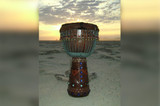Drumming, Music and Hearing Loss
Whether in the car, at a show, drum circle or in the comfort of one’s own living room, loud music is one of the guilty pleasures of fans and musicians alike. From the deep bass of rap and hip-hop to the screaming guitars of classic rock, if it’s too loud, you’re too old, so they say. The volume of music, however, is known to cause damage to the delicate anatomy of the ear. Hearing loss affects around 16 million Baby Boomers, a figure that is significantly impacted by the volume of music played and performed. In fact, there are more Boomers affected by hearing loss than senior citizens with the same impairment.
Musicians, however, may be the exception to this rule. Researchers at Northwestern University noted the ability of musicians to decipher the difference between high and low notes, especially those that began playing an instrument as a child. These same musicians were then put through a range of tests to determine if the early music training would counter-affect age-related hearing loss in regular conversations. The musicians tested were able to better follow conversations in public places by focusing on the conversation and tuning out background noise, proving that early music exposure not only benefits behavior and academics, but also can decrease hearing loss as we age.
Hand drumming, like other music, can not only help retain the “musician’s ear” ability to distinguish between low and high tones, but also can provide a way for those with hearing loss to continue to play music. The act of drumming on a Djembe or other percussion instrument allows musicians to experience music in a more tactile manner that can stimulate the brain in the same way as listening to loud music on a stereo, or at a concert. While large drum circles can get loud, the typical noise level of a drum circle is well below the decibel rate proven to cause permanent hearing loss.
From hearing loss to autism, music and drumming remain creative and effective therapy tools for people in all walks of life. As science continues to prove the unlimited benefits of music for people of all age and ability, the inclusion of music within schools, therapy centers or as a profession or hobby can increase the quality of life for everyone.
Recent Posts
-
What is the Best Size Djembe for Beginners?
If you're new to the world of percussion and interested in learning the djembe, you're in for a t …16th Jul 2024 -
The Benefits of Becoming a Drumming Teacher: Transforming Passion into Profession
Why become a drumming teacher? Becoming a drumming teacher is an excellent way to share your pas …22nd May 2024 -
What Makes the Djembe Drum a Spiritual Instrument in African Music?
Origin and history of the Djembe drum The Djembe drum originates from West Africa and holds sign …16th May 2024



